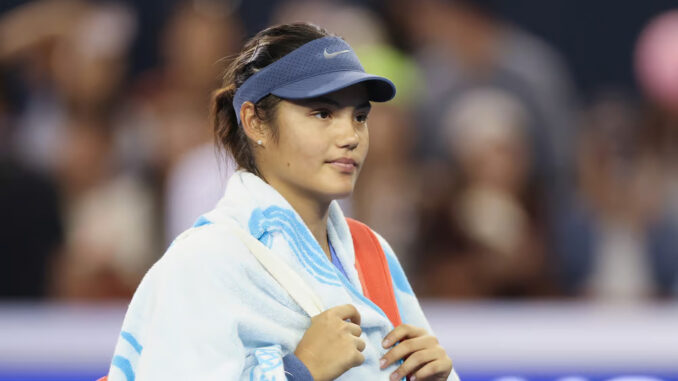
The sun-scorched courts of the Wuhan Open were meant to be a stage for Emma Raducanu’s resurgence, a place where the 22-year-old British No. 1 could showcase the grit and growth that have defined her 2025 season. Instead, they became a crucible, testing her in ways no forehand or backhand could prepare her for. On a sweltering September afternoon, with temperatures climbing to a punishing 36 degrees Celsius and humidity choking the air at nearly 70 percent, Raducanu faced American qualifier Ann Li in the first round. What began as a chance to build on her recent progress—a hard-fought battle against Jessica Pegula in Beijing’s China Open—spiraled into a moment of raw vulnerability that gripped the tennis world.
Raducanu, ranked No. 30 and riding a wave of quiet confidence after sharpening her game in recent months, started the match with her trademark intensity. But the elements were merciless. By the second set, trailing 6-1, 4-1, her body betrayed her. Dizziness set in, her breaths grew labored, and her face flushed under the relentless heat. As she clutched her chest, the Centre Court fell silent, the crowd’s cheers replaced by concern. Medical staff swarmed, checking her blood pressure and temperature, their urgency a stark contrast to the stillness of the moment. With a heavy heart, Raducanu retired from the match, her second early exit in Asia this season after a string of tough losses in Seoul and Beijing. The Wuhan withdrawal wasn’t just a defeat; it was a reminder of the physical toll the tour extracts from even its brightest stars.
The scene wasn’t unique to Raducanu. Across the tournament, the heat wreaked havoc. Jelena Ostapenko, the 2021 French Open champion, collapsed under similar conditions, retiring against Sorana Cirstea after succumbing to heat stroke. From her recovery, Ostapenko shared a message of gratitude and resolve on social media: “It was a tough day. I suffered a heat stroke today. Thank you China for the atmosphere, emotions and incredible energy from the crowd. I am truly sorry that I had to finish the match this way. I will be back stronger next year.” In Shanghai, Novak Djokovic battled nausea courtside, later calling the conditions “brutal,” while Holger Rune’s fiery outburst—“Why doesn’t the ATP have a heat rule? You want a player to die on the court?”—ignited a firestorm over player safety. Organizers, rattled by the outcry, pushed Wuhan’s match starts from 1 p.m. to 3 p.m., a small nod to the athletes risking their health under an unforgiving sky.
Amid the chaos, Raducanu’s opponent, Ann Li, showed the sport’s heart. Pausing her post-match interview, she offered words of empathy: “First, I want to wish Emma a fast recovery. Not sure what, but looked like she wasn’t feeling good. But yeah, tough match last time, so I knew it was going to be tough, but I wish her to feel better.” Her sportsmanship underscored the camaraderie that binds competitors, even in defeat’s shadow.
Three days later, Raducanu reemerged, not on the court but in a Wuhan hospital room, her spirit unbroken. In a poignant Threads post, she shared a photo—clad in a navy Nike hoodie, sunglasses shielding her eyes, perched on a sterile bed. Her caption was a masterstroke of resilience: “Last day at the doctors in Wuhan. Feeling better now. Shame I couldn’t continue there, but thank you for the messages,” she wrote, punctuating it with a bandaged heart emoji. The image captured a warrior regrouping, her focus already shifting to the battles ahead. Fans flooded her post with support, their messages a lifeline as she navigated the disappointment of a curtailed campaign.
Raducanu’s Asian swing has been a rollercoaster. With just two wins from five matches across Seoul, Beijing, and Wuhan, the points she craves to secure a seeded spot at the Australian Open slipped further from reach. Yet her ambition burns bright. Before Wuhan, she’d laid out her vision: “Being seeded for Australia is a big target for me over the next few weeks. I think the higher you can go, the better it is, but it is still down to the luck of the draw. I’ve just been happy with the improvements in the last few weeks I’ve made in my game, and I just want to keep going with that.” The words reflect a player undeterred by setbacks, her eyes fixed on the horizon.
Her next steps are already mapped. A wildcard awaits at the WTA 500 in Ningbo, October 13–19, where she’ll face a daunting field including Pegula, Mirra Andreeva, and Jasmine Paolini. Tokyo’s Toray Pan Pacific Open (October 20–26) offers a debut shot at another WTA 500 title, with Elena Rybakina, Naomi Osaka, and defending champion Qinwen Zheng in the mix. The Hong Kong Tennis Open (October 27–November 2) closes her Asian odyssey, a final chance to bank ranking points and momentum. Last year, injury kept her from Ningbo; this time, recovery fuels her fire.
Raducanu’s journey—from the fairy-tale US Open triumph at 18 to the crucible of the pro circuit—has never been linear. The Wuhan scare, a collision of ambition and human limits, adds another chapter to her saga. Yet, in her hospital bed post, in the quiet strength of her words, she reminds us why she captivates. Tennis demands everything—body, mind, soul—but Raducanu gives it willingly, her heart bandaged but beating fiercely. As she steps toward Ningbo, the world watches, not for the fall, but for the rise of a champion who refuses to stay down.
Leave a Reply